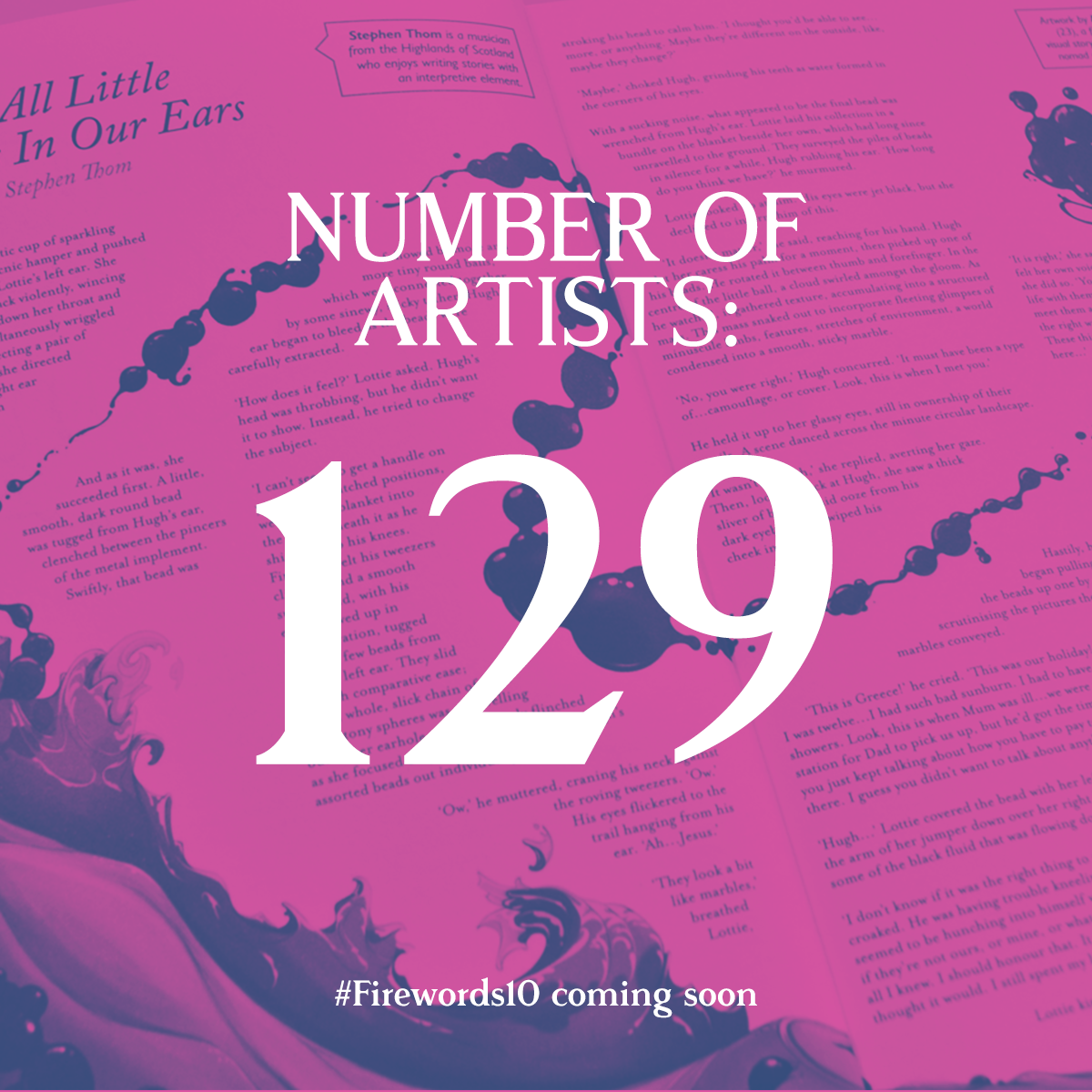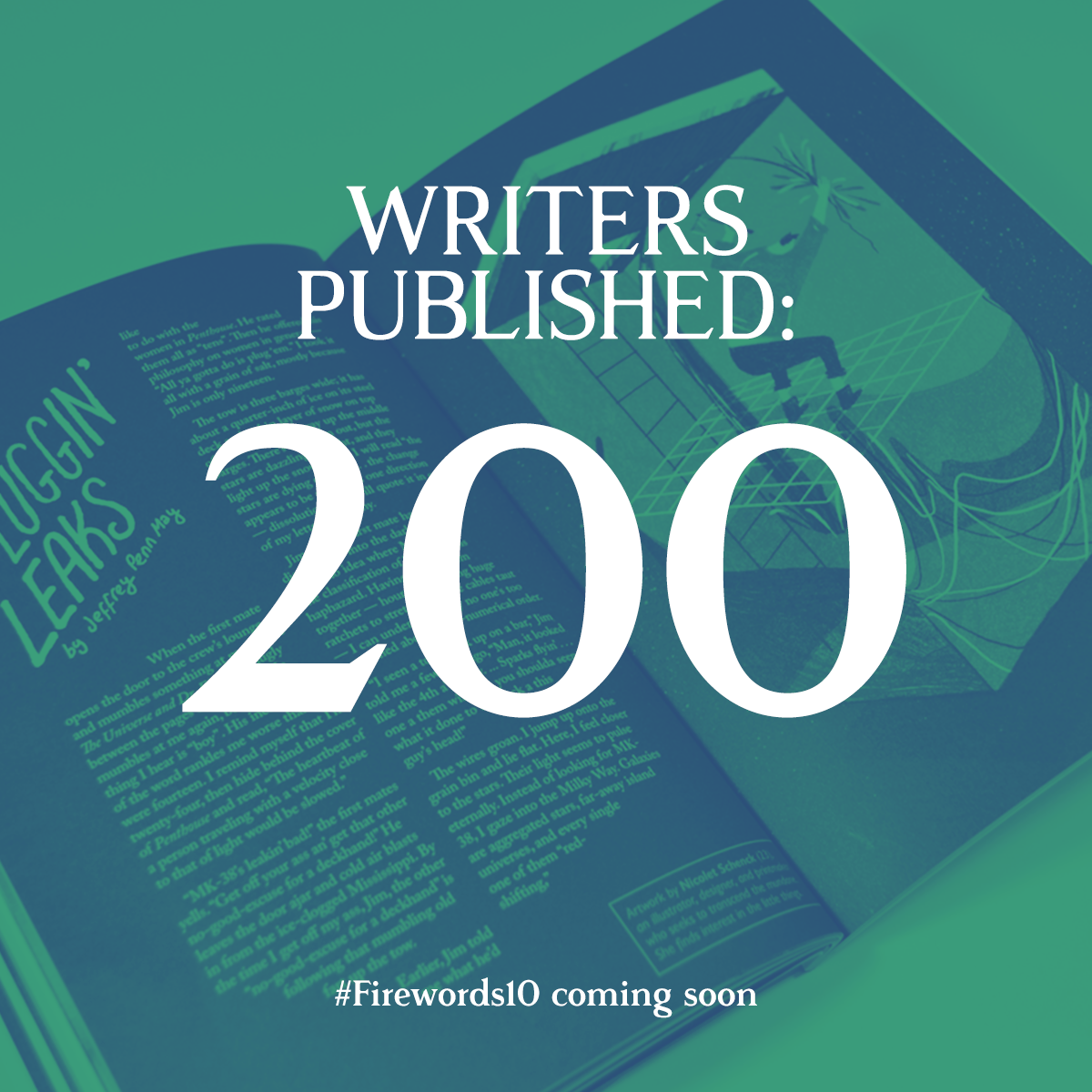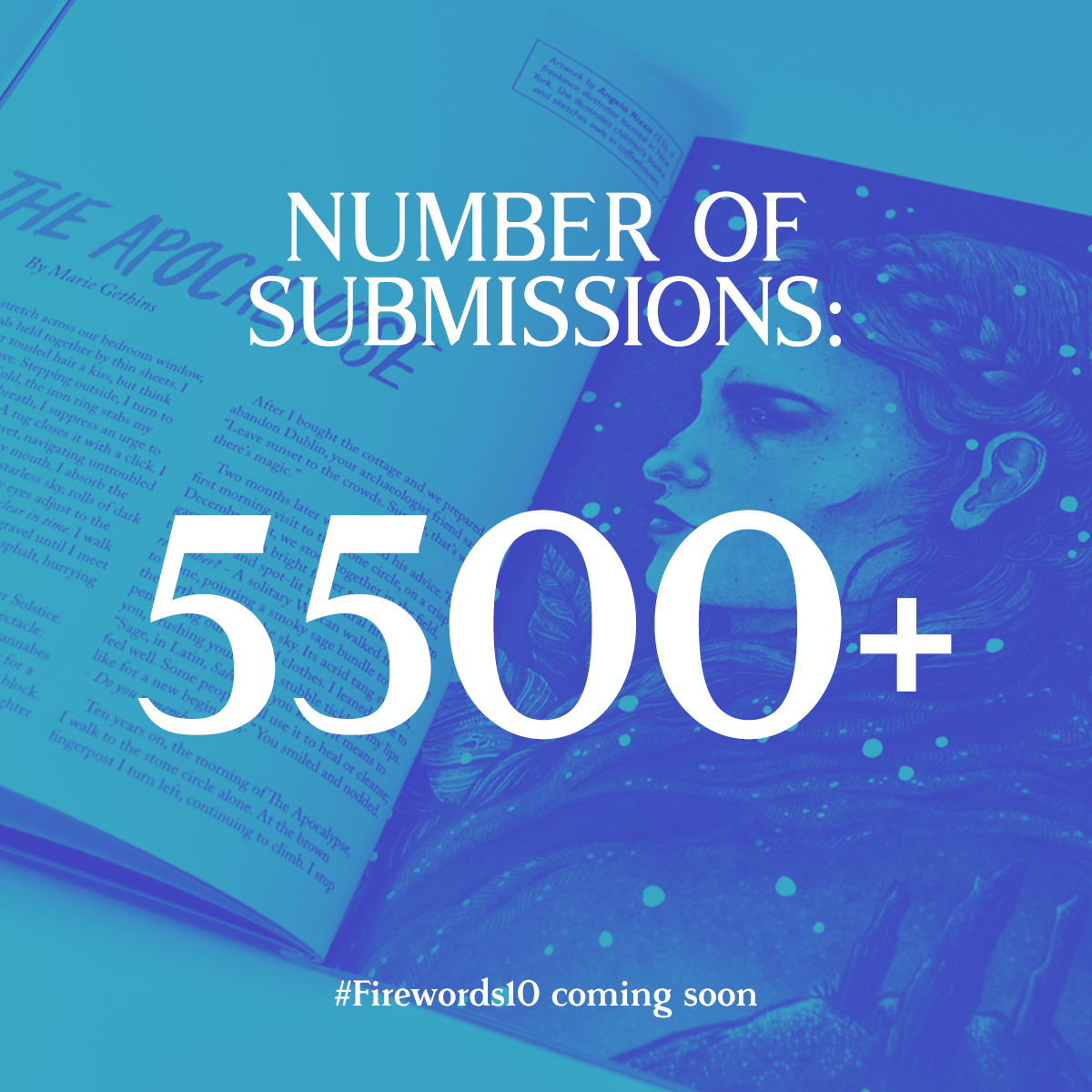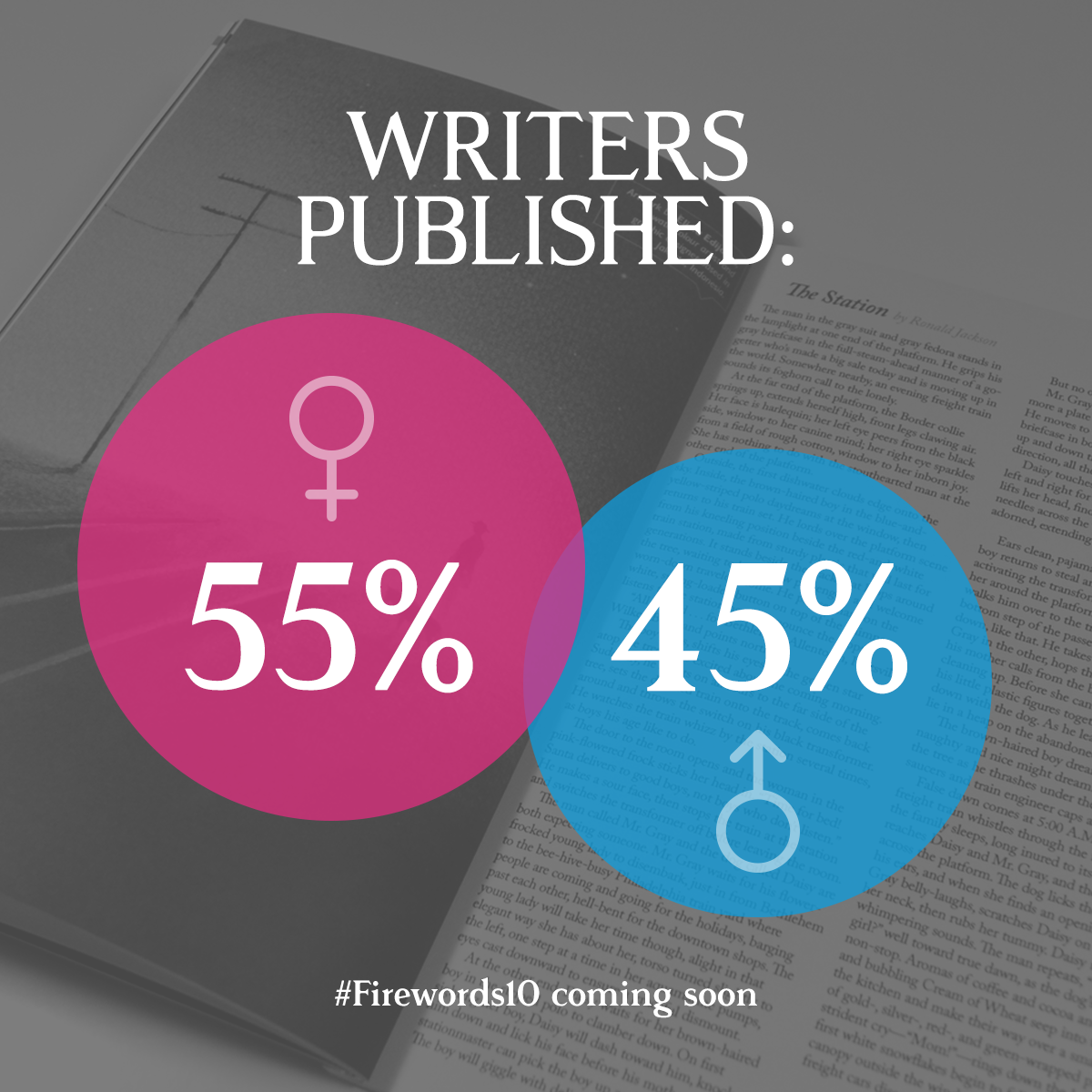Firewords is the magazine of fiery fiction & poetry brought to life with visual flair. Campfire is our digital serialised offshoot that drops regular bitesized content into your inbox. Every fortnight, come get cosy with us while we toast some marshmallows and tell stories into the night. Each piece will be accompanied by the ‘usual’ amazing, unique and colourful illustrations.
Firewords ventures into book publishing with JJ Scott’s debut novel
We’ve had our sights on expanding Firewords to publish novels as well as the magazine for a long time. There’s a lot of overlap in the world of book and magazine publishing – printing, distribution, stockists etc. and we have obviously met 100s of talented writers over the years! We’ll be starting slowly with Jen’s (publishing as JJ Scott) debut novel, The Making of Maggie Munroe, and seeing where to go from there.
Set in wartime Glasgow, Scotland, and inspired by stories from JJ’s childhood told to her by her gran, including the revelation that her gran had been proposed to by four different men (talk about a plot twist!), we’re excited to bring the story of Maggie Munroe to the world.
We’ll have more details soon so watch this space.
Falkirk, Scotland - learning about its history and culture through stories
Battle of Falkirk, 1298
COVID-19 UPDATE 24/09/20
As it stands, we are still very much continuing to accept orders and send out copies of Firewords. However, due to the ongoing pandemic and UK lockdown, please be aware that delivery times will likely take longer during this time. Please accept our apologies for any delays.
Digital Sale
As shipping physical copies is becoming more and more difficult, we have lowered the price of all our digital editions so you can still get Firewords easily. Check out the sale here.
Orders to Argentina, Australia, Brazil, Canada, Croatia, Cyprus, Gibraltar, Iceland, India, Israel, Japan, Lithuania, Mexico, New Zealand, Romania, Saudi Arabia, Slovenia, South Africa, South Korea, United Arab Emirates, USA
Due to the lack of availability on certain flights, we can not currently offer the usual airmail service to these countries. Orders will therefore be sent by boat and could experience delays of up to 2-12 weeks.
Artist interview: The secrets behind the cover of Issue 10
We wanted something special for the cover of our 10th issue (copies still available here) and with the theme of ‘Curiosity’ we know Guillermo Ortego was the man for the job. We’ve worked with Guillermo on several illustrations for Firewords in the past and we were always impressed by the care he puts into his conceptual thinking as well as his craft. The amazing wraparound cover he created for Issue 10 is below and in this guest post he shares some of the details you may have missed…
Record-breaking: How to write a collection
FJ Morris is the author of ‘In a Small Pond’, a short story we published in Issue 6 of Firewords. Since then, she has published a brilliant collection of her own and in this article she shares some thoughts on how she managed to succeed.
———
In November last year, my collection ‘This is (not about) David Bowie’ was released into the big-wide-world of books. There are so many inspired ways to put together a collection, but just for the record, here’s mine…
Double figure milestones
With Issue 10 being a big milestone for us, we took the opportunity to look back at the Firewords story so far. We've done the maths and totalled up a few fun stats of our 10 issues...
We've collaborated with 129 artists, illustrators, photographers and hand-letterers. All have been unique, talented and a joy to work with.
We've had the huge pleasure of being able to publish 200 writers over the years (and some multiple times!) It means so much that they all chose Firewords as a home for their work and the magazine wouldn't exist without them.
Working out the exact number of submissions is hard as many include several pieces (especially with poetry) but 5500+ submissions is a close estimate! It's hard to believe we've read so many stories and poems over the years. Thank you to everyone who has taken the time to send some work our way.
We read submissions blind so gender isn't a consideration when choosing what to publish but we were happy to calculate that we've published a fairly balanced split so far with 55% female and 45% male. (These stats don’t include those who identify as neither male or female or those who didn’t state their gender when submitting) Publishing a diverse mix of voices is so important to us.
We love the global nature of this project and feel very honoured to have received submissions from 89 countries around the world 🌎
Thank you to everyone who has helped us reach this milestone and here’s to many more to come.
We will soon be opening submissions for Issue 11 (Wednesday 19th December), so if you’d like to be part of the story going forwards, why not send something our way?
What makes characters great?
Our last article looked at common mistakes with characters, but now we look at what writers are already doing particularly well and celebrate the worlds they have been able to create thanks to great characterisation. We will use our latest issue, Firewords9, to illustrate this and give real examples of great character development.
As always, good writing does not follow a prescribed tick list but...
Let's meet three characters to avoid
Good characters really pop off the page, even when a story is driven more by plot and action. This can be achieved in a variety of ways (some of which we will look at in the next article) but sometimes writers struggle. Reflecting on the submissions received for Firewords 9, it is clear to see how important characterisation is.
Here, we talk about the three most common mistakes in character creation we see. It is not an exhaustive list but we hope you find it a good place to start. Even if you are full of confidence, do any of these apply to you?
Making New Year’s writing resolutions (and actually doing them)
What is it about the start of a new year that makes us want to change something about our lives? New Year’s resolutions are a great way of becoming motivated to make a positive change, but they are also renowned for being difficult to keep – according to U.S News, 80% of resolutions fail by February. This can be for many reasons, such as making too many or not making them realistic. So with the odds stacked against them, is there any point? And if so, how do we make them stick?...
5 reasons to submit to literary magazines
If you’re relatively new to submitting your work to literary magazines – or you’ve been doing it for a while and are feeling jaded – it’s easy to wonder, why bother? It’s certainly not for the money; the unfortunate truth is most publications don’t have the budget to pay writers (us included) and those that do can often only provide a nominal amount. So, if it doesn’t pay the bills, what exactly is the point? Here are some of our favourite reasons and benefits...
How to generate story ideas
For me, short stories and poetry take a lot of time and dedication to polish up to a standard whereby anyone but my nearest and dearest can read them. It was therefore surprising to me that, after writing the majority of this article, I could sit back and understand that my best story ideas do not come from a place where I’ve painstakingly honed my skill (as if!). All the stories that I love (and stick with) originate from a place of fun...
Should you ever give up on a story?
How artwork brings writing to life
This week, I am extremely excited to be writing an article about the illustrations used in Firewords. I deal with the proofreading and editorial side of each issue so I approach the illustrations as an enthusiastic reader. This article will come from the eyes of a novice. It will describe what illustrations can bring to the ordinary reader who wants to enjoy a good story or poem at bedtime, over a cuppa, on the train on the way to work or relaxing on a park bench.
To demonstrate this, I have used a few examples from the recently published Firewords 8. Unfortunately I cannot mention all our artists below.
The cover art
Each edition of Firewords has a particular theme and this is encapsulated by the cover. It sets the tone for each story and poem, no matter if it is dark or light-hearted. Take the cover of Firewords 8 by Luisa Rivera, for example...
Crafting the perfect story – Part 3: The ending
In part 1 and 2 of this series, we looked at the beginning and the middle of effective short stories. Now it’s time to jump to the ending.
All we hope to do here is give examples of the kind of endings you could use. However, whatever you choose will completely depend on the entire context of the story you have written. The list below is quite comprehensive but endings come in all shapes and sizes, so something completely different may better suit your piece. For each ending, we’ll also be using example stories from the latest edition of Firewords.
The twist ending
This kind of ending is one that takes the reader completely by surprise. Often (though not always!) the success or failure of this kind of story hinges on hoodwinking your reader. Here a real challenge arises...
Strong verbs for powerful writing
Those of you who read our article about the middle of short stories and how important it is to keep reader engagement will remember that we touched on the significance of strong verbs. These can be replaced by writers who think it is more effective to use adverbs say, for example, ‘He laughed heartily’, when using one great verb to say ‘He guffawed’ would in fact be far more effective. Like everything in the world of writing, there is no hard-and-fast rule as to when to replace an adverb with a verb but we did think it was an area that was often overlooked and was worth revisiting.
I will firstly make a comparison between well-chosen verbs and adverbs, and then mention why I believe it is important to make the right choice when deciding on the verb to use...
Crafting the perfect story – Part 2: The middle
This is part 2 of a series of articles about the different elements of a short story. If you followed Part 1, you’ve now got a strong opening and the reader is in the palm of your hand. The middle can be difficult to get right because it’s the meat of the story. The start and end are exciting – you can begin and close with a bang – but if the middle fails to engage the reader, a strong beginning and ending are useless.
If the middle of your story is weak, here are three options to consider that could spice it up and ensure your reader remains engaged...
Make your reader feel something
Writing with a good degree of sentimentality is a tricky thing for any writer to do well. There is a fine line to walk between being sickeningly sweet and turning your back on emotion altogether. These two pitfalls, which we see regularly, are:
- Writing for sentimentality’s sake. Here, the writer seems more concerned about the effect on the reader than the content of the story. The images used to convey emotion are carefully constructed, yet the reader is aware of the construction...
Crafting the perfect story – Part 1: The beginning
This is the first of a series of articles in which we split the short story form into 3 parts: the beginning, the middle and the end. Each is important to get right in order to grab your reader’s attention, keep them entertained and make the whole thing worth their while. No pressure then!
We’re starting in a logical place with arguably the most important sentence of your whole short story: the very first one. Crafting the perfect beginning to a story is an art form in itself and should not be taken lightly...























